Knoxville, TN (Oct. 22, 2024) – The Institute for Advanced Composites Manufacturing Innovation (IACMI) announced today two new partnerships with Mississippi State University in Starkville, MS, and Penn State Behrend in Erie, PA. These partnerships aim to revitalize U.S. manufacturing with a focus on the machining industry. Machining and machine tools are a foundational element of America’s advanced manufacturing capabilities, which are essential to the country’s national security and continued economic vitality.
The new partnerships will advance America’s Cutting Edge (ACE), a joint Department of Defense (DOD) and Department of Energy (DOE) initiative launched in 2020 to reestablish American leadership in the machining industry through transformative thinking, technology innovation, and workforce development. Expanding the number of training centers is a key part of ACENet, a national network of 39 machine tool workforce development sites across 14 states.
“Being established as an ACE Hub through the IDEELab at Mississippi State University is an extraordinary achievement, not only for the university but also for the entire state of Mississippi,” said Ross Smith, IDEELab Director. “This partnership solidifies Mississippi’s critical role in advancing America’s cutting-edge manufacturing capabilities. The IDEELab at Mississippi State University’s involvement in the ACE initiative will help revitalize the U.S. machining industry by fostering innovative technology development and workforce training that will have a profound and lasting impact on the state’s economic future. By positioning Mississippi as a leader in this national effort, the IDEELab at Mississippi State University ensures that our state will play a key role in strengthening American manufacturing and supporting the nation’s long-term security and prosperity.”
“Penn State Behrend is proud to offer the ACE CNC machining program. This training program will be a tremendous benefit to our students, local manufacturers, and the community,” said Mark Rubeo, assistant professor, mechanical engineering. “We are very appreciative to our sponsors, friends, and collaborators at IACMI – The Composites Institute for this opportunity, and we look forward to helping address the nationwide shortage of skilled machinists by delivering high quality hands-on training.”
ACE uses free online and in-person, hands-on training to connect top national experts with students and incumbent industrial workers from all backgrounds, levels of education, and work experience to catalyze awareness and interest in all facets of machining, including software development, metrology, design, operation, and entrepreneurship. To date, ACE has delivered online courses in CNC machining to more than 11,000 students from all 50 states and in-person bootcamp-style training to more than 2,000 students, all at no cost to participants.
“We must close the workforce gap in the U.S. when it comes to machine tool resources,” said Mark Morrison, workforce development lead for IACMI. “I believe the more people we can expose to the ACE training, the better chance we have of growing the country’s machine tool capabilities from the ground up. ACE directly addresses the critical shortages of skilled industrial workers by exposing next generation machinists, operators, engineers, designers, and entrepreneurs to advances in machine tool technology.”
“Many people like to talk about innovators and entrepreneurship, but the real knowhow of something is embedded in the making process,” said Ms. Adele Ratcliff, Director of DoD’s Innovation Capability and Modernization office which helps fund ACE through its Industrial Base Analysis and Sustainment program. “Most everything that’s made at scale uses a machine tool. If you know how to make it, then you know how to innovate on it faster. We want to restore the innovation within the U.S. machine tool sector.”
With that goal, DOD and DOE’s Oak Ridge National Laboratory (ORNL), along with IACMI, created ACE, a public-private partnership designed to help close the skills gap and restore American dominance in machine tool technology and innovation.
Through ACE, DOD established a national computer numerical control (CNC) machining training program developed by University of Tennessee, Knoxville, professor Tony Schmitz. The program brings together the scientific expertise of ORNL’s Manufacturing Demonstration Facility and the proven workforce development capabilities of IACMI.
“People love to make things, and when they do, they feel good about themselves,” said Ms. Ratcliff. “The ACE curriculum allows people to experience machining often for the first time. By expanding those opportunities for more people to go through hands-on training, we’re hoping to inspire the next generation of manufacturers in this country.”
About IACMI – The Composites Institute
IACMI – The Composites Institute is a 160-plus member community of industry, universities, national laboratories, and federal, state, and local government agencies working together to accelerate advanced composites design, manufacturing, technical innovation, and workforce solutions to enable a cleaner and more sustainable, more secure, and more competitive U.S. economy. IACMI is managed by the Collaborative Composite Solutions Corporation (CCS), a not-for-profit organization established by The University of Tennessee Research Foundation. A Manufacturing USA institute, IACMI is supported by the U.S. Department of Energy’s Advanced Manufacturing Office, as well as key state and industry partners.
About ACE – America’s Cutting Edge
America’s Cutting Edge, supported by the U.S. Department of Defense (DOD) Industrial Base Analysis and Sustainment program, is a national computer numerical control machine training program designed to reestablish American leadership in the machine tool industry through transformative thinking, technological innovation, and workforce development. The curriculum combines advanced training tools and techniques from the University of Tennessee, the scientific expertise of the Department of Energy’s Manufacturing Demonstration Facility at Oak Ridge National Laboratory and the proven workforce development capabilities of IACMI.
ACE has expanded beyond the initial testbed of the University of Tennessee to include nine training hubs at North Carolina A&T State University, Texas A&M Engineering Experiment Station, Marshall University Advanced Manufacturing Center, University of Florida, St. Cloud State University (Minn.), University of St. Thomas (Minn), Mississippi State University and Penn State Behrend. There’s a growing network of over three dozen machine tool training partners in 14 states, including high schools, trade schools, community colleges and universities.
About IDEELab at MSU
The Innovation Design Engineering Educational Laboratory (IDEELab) at Mississippi State University is a cutting-edge R&D partnership facility dedicated to enhancing workforce development, fostering industry collaborations, and driving innovation across the manufacturing and engineering sectors. As a central hub for industry growth, IDEELab provides state-of-the-art facilities that support both academia and industry in advancing technological solutions, increasing competitiveness, and preparing a highly skilled workforce for the future. The lab’s mission is to increase the Workforce Readiness Level (WRL) of engineering students and industry professionals, with a particular emphasis on bolstering the state of Mississippi and the southeastern United States. By equipping individuals with essential skills and hands-on experience, IDEELab seeks to strengthen regional industries and contribute to economic growth while leading in innovative research and workforce development initiatives.
About Penn State Behrend
Penn State Behrend is a comprehensive four-year and graduate college of Penn State, located on the former Glenhill Farm estate in Erie, PA. The college, which is home to 4,400 students on-campus and online, is structured as an Open Lab – a living laboratory where students and faculty experts partner with business and industry to develop new products, improve business processes, and solve market and social challenges. Learn more at Behrend.psu.edu.
June 13, 2024 – It all started with one.
After America’s Cutting Edge launched in December 2020, the program got its start with its first online registrant.
That was the snowball that began an avalanche towards a milestone 10,000 strong.
Not long thereafter, in-person CNC machining training began in 2021. Several other online courses have been added. And almost three dozen partners from twelve states are now a part of the ACE network.
One by one, people have turned to ACE to get the training they need to explore a machining career or upskill to advance their career path.
“Knowing these machines better will help me with my designs and help me work more directly with machinists,” said Hunter Kelley, Beehive Industries engineer in a 2023 interview.
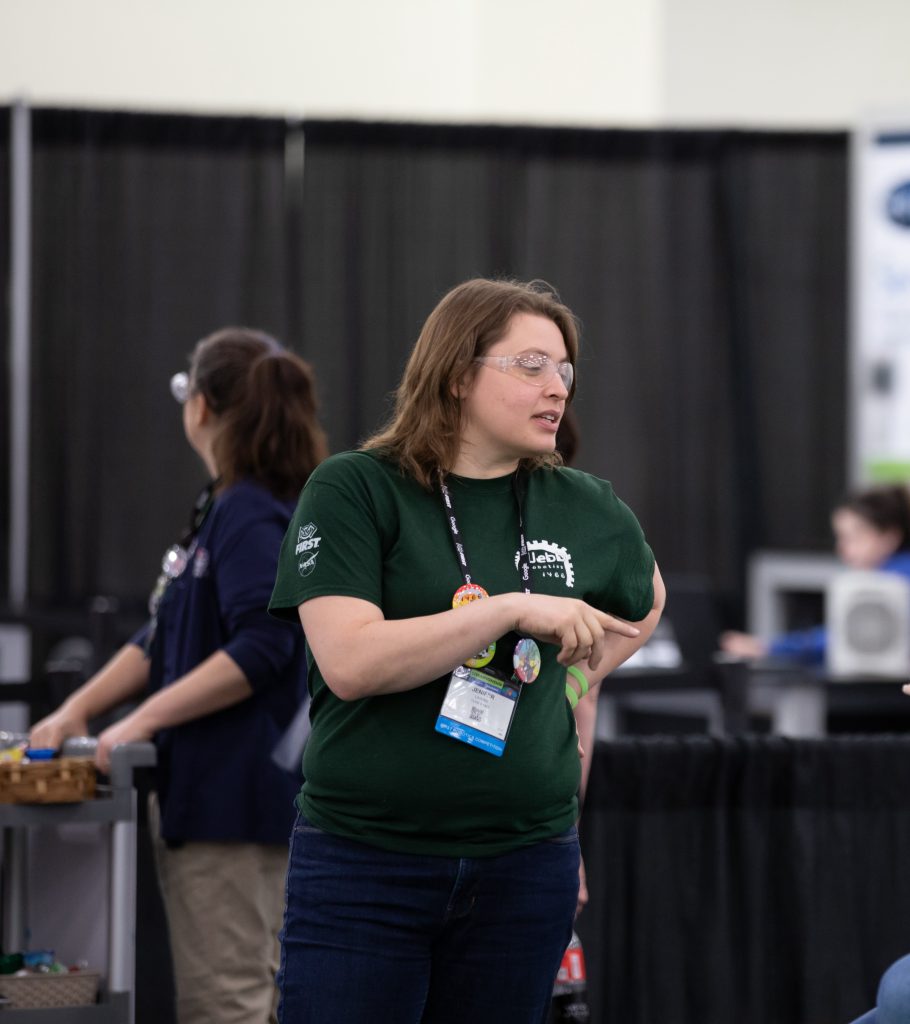
“The in-person training was the perfect way to give hands-on experience for even a novice like me,” said Neeki Meshkat, University of Tennessee, Knoxville, biomedical engineering student in a 2022 interview. “They weren’t just machining something in front of you but letting you do it yourself. That makes a huge difference in learning something.”
Now, America’s Cutting Edge is celebrating a landmark milestone: 10,000 people from all 50 states have registered for an ACE online course.
The 10,000th person to register, Jenifer Lawrie, a FIRST Robotics mentor and coach at Webb School of Knoxville, says the content will help her elevate her skillset and expand her students’ boundaries.
“As a high school science teacher and a FIRST Robotics competition coach, I push my students to develop new technical and machining skills,” she said.
“Registering for ACE courses online allows me to work through course content with my students, offering encouragement for them as they develop knowledge for career and college engineering, and as they go on to complete in-person training. This opportunity helps me to become a better mentor for my high school students, as I build my understanding of machining and mechanical design.”
For the past three and a half years, most registrants have picked the flagship CNC machining course; nearly 8,000 individuals have taken that step to improve their resume.
While many have gained the training they needed through the classic Fusion 360 pathway, some have elected the recently-debuted Mastercam pathway as their preferred training software.
Metrology has been a popular second choice, with over 1,200 people taking the two-hour course. Soon, it will have its own bootcamp after a handful of participants took part in the first in-person training in April.
“There is value to this content and how it links to industry needs,” said metrology bootcamp participant Andy Polnicki with Pellissippi State Community College.
Hundreds more have either elected to learn more about composites or cybersecurity.
For ACE curriculum developer Dr. Tony Schmitz, it’s a thrilling accomplishment to see so many lives touched in such a short time.
“During the pandemic, I sat at my kitchen counter for hours on end preparing a CNC machining curriculum that I hoped would be beneficial to the manufacturing community,” said Schmitz. “That content became the first offering of the ACE program. I could not have imagined the impact we’ve had so far and am grateful for those who have joined the online and in-person training. I look forward to the next 10,000 participants!”
The makeup of the first 10,000 – as well as the next 10,000 and beyond – is focused on every single person. It’s not just numbers – it’s lives being shaped.
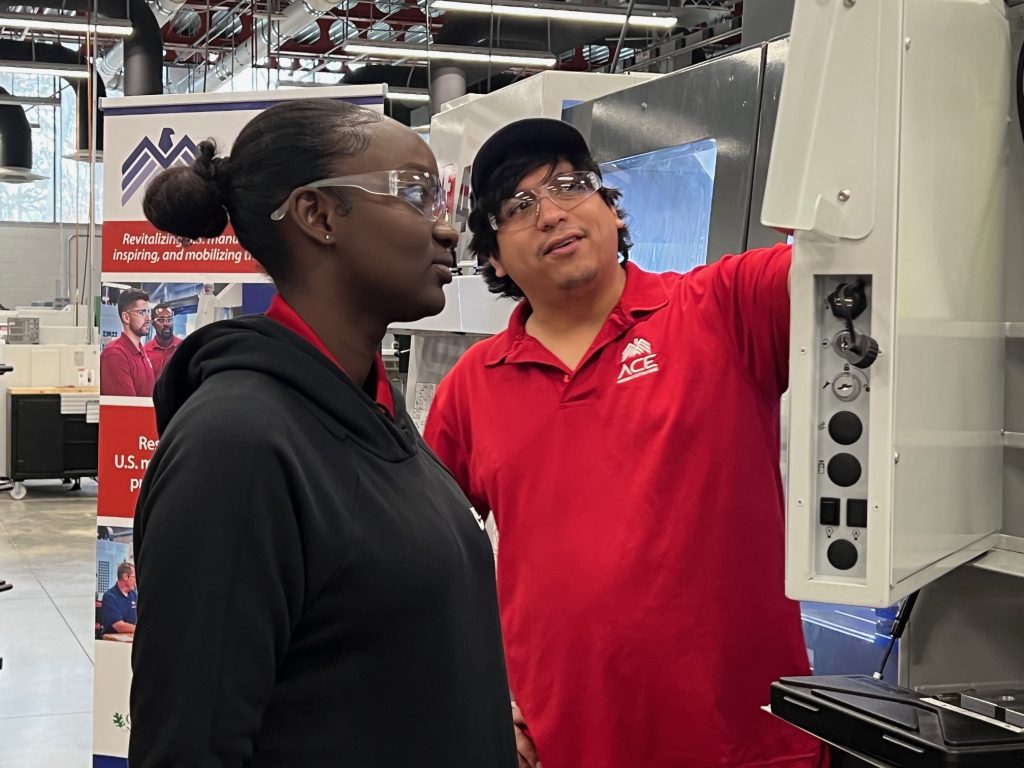
“Every participant matters, and ACE is for everyone,” said Joannie Harmon, IACMI vice president of workforce development. “Each person that goes through ACE training unlocks the potential to create massive change for their life while helping to increase domestic machining.”
Case in point: Mama Salla, an ACE alumna who had no prior experience before starting the program.
Yet, through her tenacity and drive to achieve, she landed an internship with MSC Industrial Supply Co. after ACE training.
The impact she made became national after working on a toolkit new ACE partners can take advantage of – a one-stop-shop for all the components needed for ACE bootcamps.
“The toolkit contains a variety of tools necessary for machining and assembling components to build the ACE air engine,” said Michael Gomez, principal research and development engineer for MSC. “Thanks to Mama’s efforts, the toolkit is a cost-effective option that will ensure machining and assembly of the air engine components during the ACE training program is more efficient.”
Stories like Salla’s, Lawrie’s, Meshkat’s and Kelley’s are what make America’s Cutting Edge what it is.
Each one of them has been transformed by the training they received – and each one transforms the world around them by their story.
Will you be the next one?
Get started by registering for an America’s Cutting Edge course now.
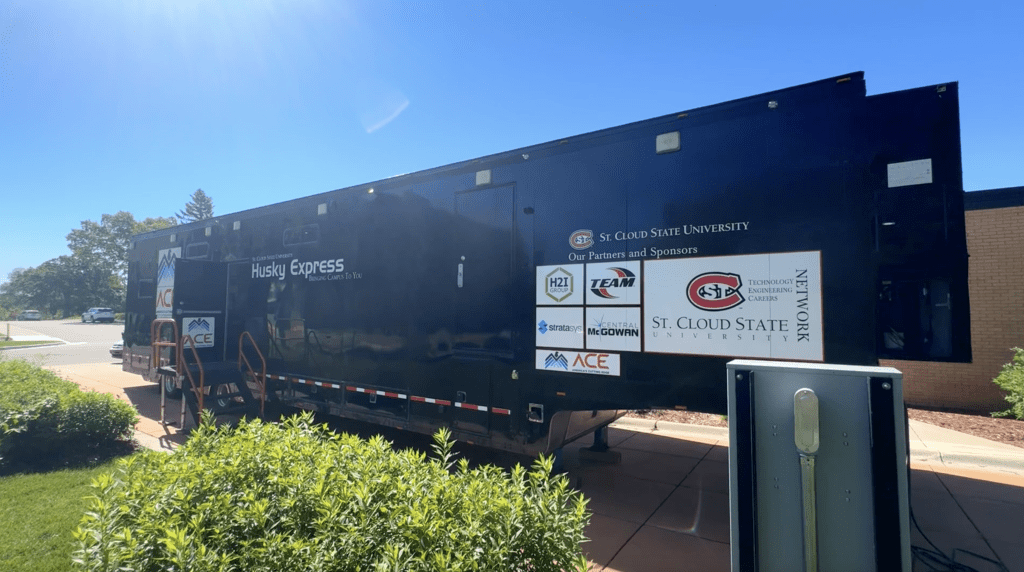
June 7, 2024 – It’s an alliteration of a title – yet also a crystal-clear conclusion about the newest effort to revitalize domestic machining.
For months, America’s Cutting Edge (ACE) partner St. Cloud State University (SCSU) has meticulously chipped away at crafting a mobile machining classroom – something that will bring the flagship ACE CNC machining training to the doorsteps of businesses, educational institutes and other locations.
“There’s a critical shortage in the workforce,” said Kurt Helgeson, SCSU professor of environmental and technological studies. “It’s an opportunity to expose people to the types of manufacturing careers out there – by bringing the training to them.”
The St. Cloud State University Husky Express – as it’s formally named – is a full-size semi-trailer, 56 feet long and 21 feet wide with the bump outs. It’s outfitted with everything needed to give someone an introduction to a machining career or learn new skills in their manufacturing jobs.
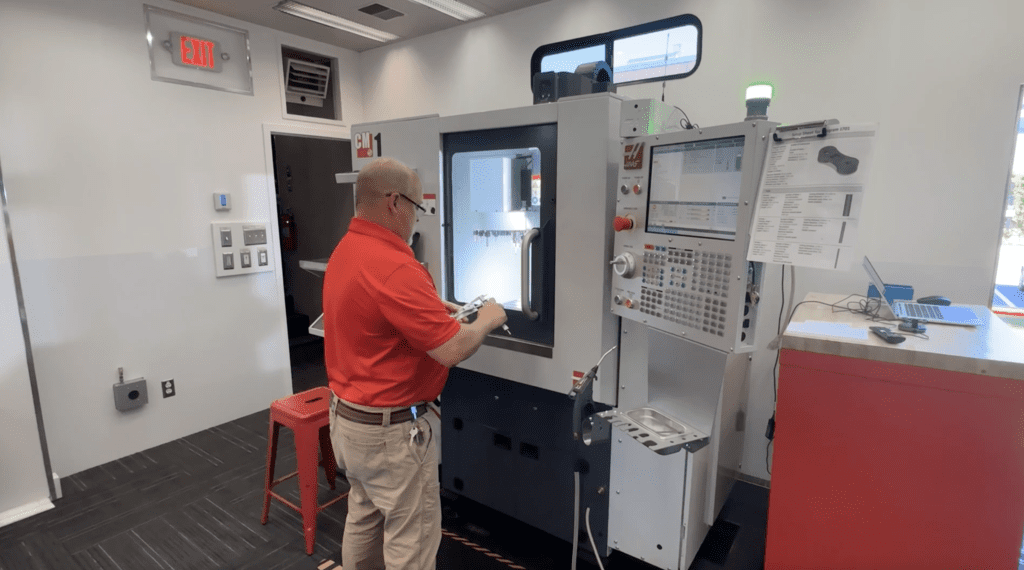
As you step into the confines of the renovated semi-trailer, a curious look around showcases a somewhat simulated shop floor in a shockingly sizable space. You’ll find a Haas Compact CNC Mill, nearly a dozen computers for CAD/CAM work, Haas simulators, a robotic arm and a 3D printer.
It’s everything you need to meet people where they are.
“Everyone today is used to not having to travel far to do things,” said Mike Sundblad, SCSU assistant professor of environmental and technological studies and ACE trainer. “You have phones that bring you anywhere. When it comes to machining, bringing this trailer somewhere and letting people experience working with the equipment is really cool.”
That will especially be effective as SCSU delivers the trailer to remote and rural parts of Minnesota – areas that traditionally may find more difficulty in getting access to exposure and training.
SCSU also has the Technology Engineering and Careers (TEC) Network at their disposal. This will empower K-12 training for teachers and students. In fact, they’re already slated to begin training teachers soon.
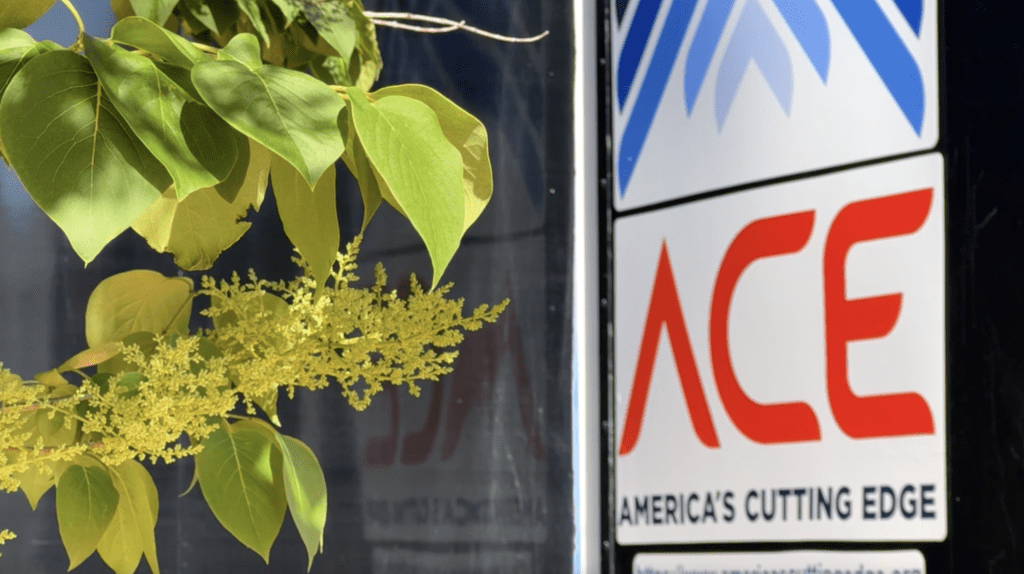
So, what’s the end result from all of this? Companies upskilling their employees on-site and younger audiences being exposed to what modern manufacturing actually looks like.
That’s also why it’s critical that this mobile unit hits the road – so it can dispel false assumptions of what manufacturing looks like.
“Everybody used to think about it as dark, dirty and dangerous,” said Helgeson. “Now, it’s high-tech. It’s bright. In a lot of the plants, you could eat off their floors because they’re so clean.”
Before you step onto the trailer, make sure to register and complete the ACE CNC machining online course. Choose your preferred online pathway and get started now.
For more information, contact Helgeson at krhelgeson@stcloudstate.edu.
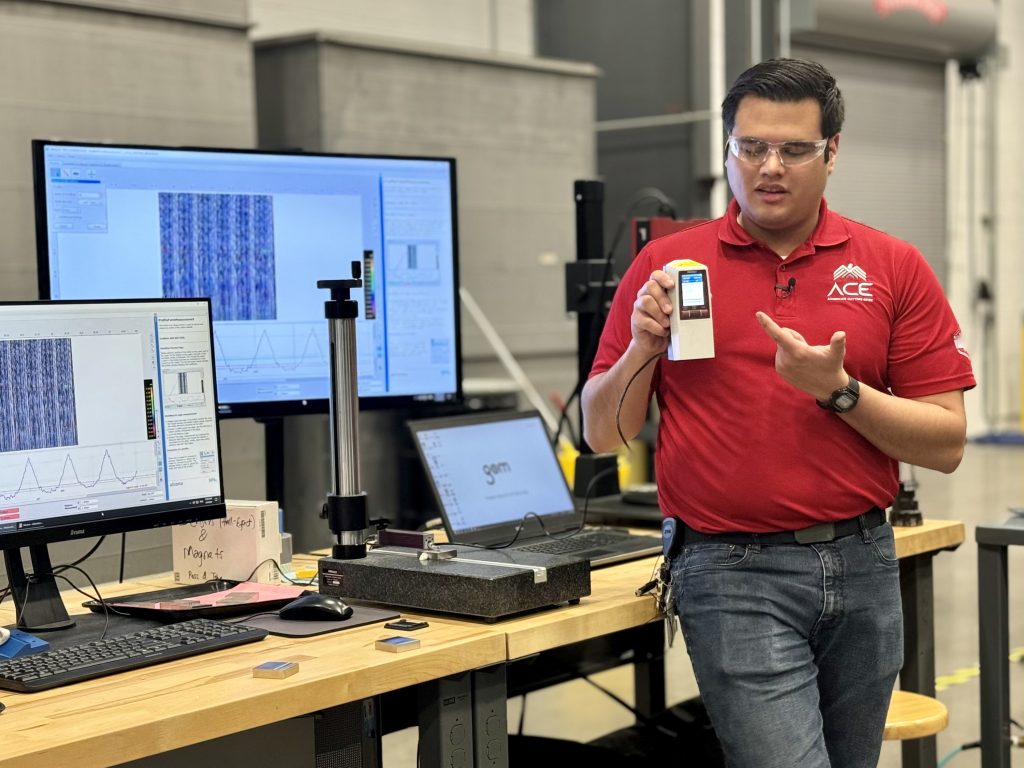
May 1, 2024 – When you go to the grocery store to pick up fresh produce, you’ll often pay per pound, but have you ever wondered just how accurate the scale at the register is?
If you were sized for a class ring in high school or college, do you remember the temperature of the room? Did you try on sample rings in hopes of finding the perfect match? Did you know others trying on rings before you could affect the metal’s temperature and your fit?
Metrology isn’t the first term that crosses our minds when we think of these every day or special life events, but its applications are critical and all around us.
“If we’re going to manufacture parts, it’s absolutely necessary that we measure those parts as well,” said Dr. Tony Schmitz, University of Tennessee professor and America’s Cutting Edge curriculum developer.
For years, America’s Cutting Edge has offered in-person bootcamps to those who complete the flagship online CNC machining course. The other courses ACE offers – metrology, composites and cybersecurity – have all been exclusively digital.
That is, until recently.
A brigade of high school students and teachers ranging from the upper secondary to postsecondary levels took to the University of Tennessee, Knoxville’s TN MADE facility April 8 and 9 for the inaugural metrology bootcamp.
The one-and-a-half day bootcamp introduced participants to a variety of metrology instruments, from calipers to CMM machines. Participants witnessed in real-time the impacts of environmental or other factors on the measurement of sample parts.
“There’s a lot of really good information that parallels with what we’re already doing,” said Elliott GeFellers, ACE trainer at Greene Technology Center. “It expands that tremendously.”
GeFellers says students have a lot to take away from in-person metrology training.
“They can see how it applies to the real world,” he said. “It’s not just being in a shop making a part. They can see there are standards.”
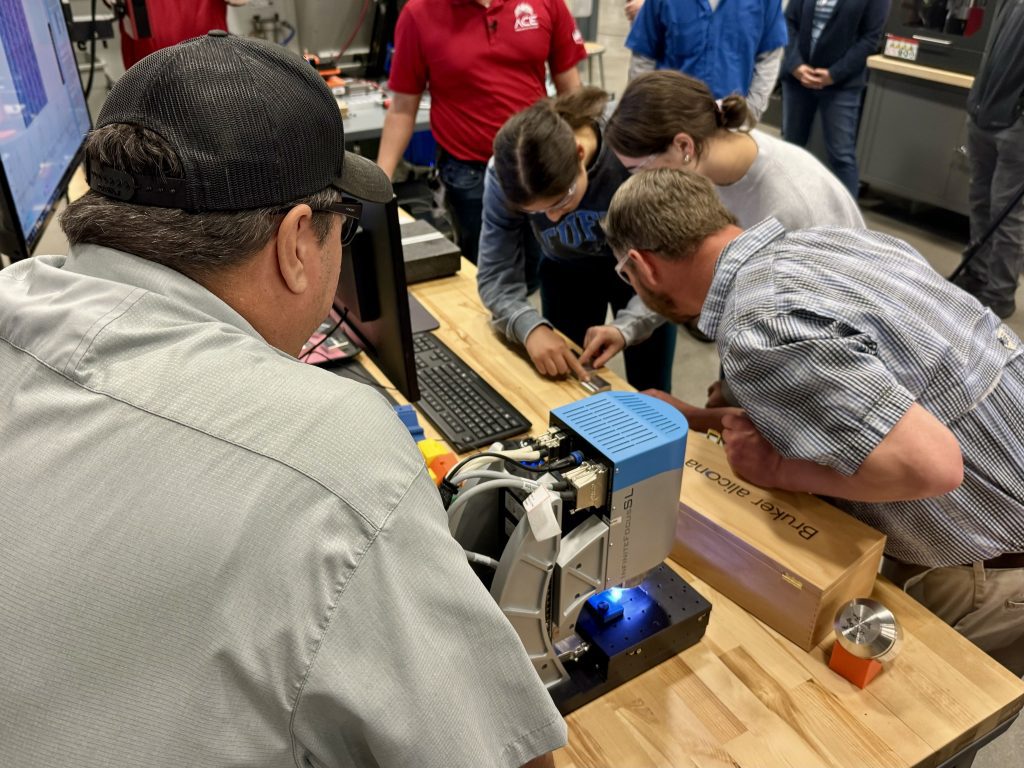
Those standards – reviewed during the bootcamp – come from the National Institute of Standards and Technology (NIST). They’ve created a framework that manufacturers use to reference as they perform measurements.
Bo Price, lead ACE instructor at the Tennessee College for Applied Technology – Knoxville, says those standards must be remembered at all times.
“I want students to understand that the inspection of parts that they’re putting out is as important as the cutting process,” he said.
Speaking of students, two from Oak Ridge High School (ORHS) attended the camp. Both are involved with FIRST Robotics, a community where many ACE participants have come from because of the use of machining in robotics. They say the information learned during the camp will have far-reaching applications.
“During robotics it’s more about getting things done, but now I can make things more precise and accurate,” said Elena Vogt.
“It’s benefitted me because now I know more about measurement techniques,” said Imelia Markus-Brock. “I feel that’ll be useful when I go to college and doing research, or work in my career.”
Dr. Mark Buckner teaches at ORHS, where he also leads Wildcat Manufacturing. The program focuses on manufacturing innovations.
Even for a seasoned professional such as him – having previously worked in standing up a secondary accreditation lab to NIST – the bootcamp introduced him to new instruments.
“The new thing was structured light scanning and using ZEISS software,” he said. “I’d love to be able to see in the future how to use it in reverse engineering and the creation of digital twins.”
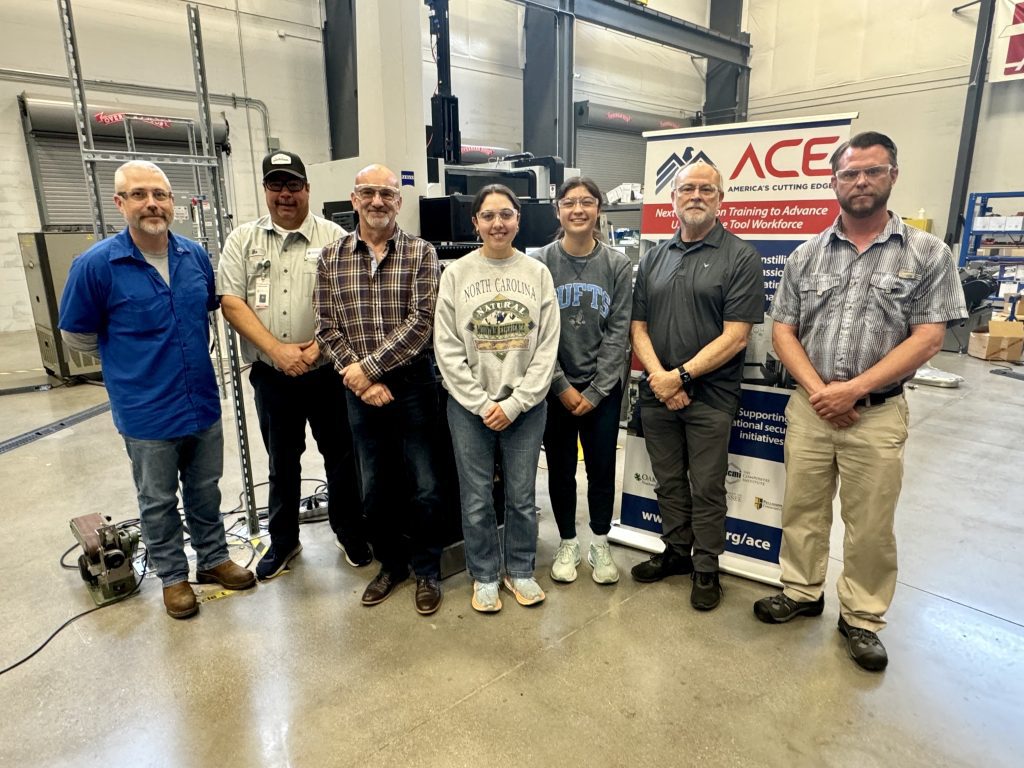
While the bootcamp focuses heavily on instrumentation and terminology, Schmitz emphasized connections between the content and real-life situations. Is the scale at the store for your produce accurate? How warm or cool was it in the ring-sizing room?
“I wanted to provide context and additional information for why this is relevant,” said Schmitz. “Making connections between things I’ve learned and experiences I’ve had is a great outcome for this program.”
As for what happens next, Pellissippi State Community College’s Andy Polnicki believes the training can easily be integrated into existing curriculum.
“It’s the type of content we can add to an introduction class we have in the mechanical department – before they get to those advanced classes later,” said Polnicki. “There is value to this content and how it links to industry needs.”
Future metrology bootcamps are being planned, but the no-cost, online metrology course is available now and takes only about two hours to complete. Click here to register.
Department of Defense workforce initiative inspiring young people, kickstarting careers, and addressing critical manufacturing skills gap in the United States
KNOXVILLE, TN (Dec. 7. 2023) – On Dec. 7, 2020, University of Tennessee (UT) professor Tony Schmitz took a bold step in helping revitalize U.S. manufacturing.
That’s the day he launched America’s Cutting Edge’s (ACE) successful online training program.
The goals: Inspire young people about jobs in manufacturing, kickstart careers with machining training and help others further develop their skillsets. The program has grown to certify participants in CNC machining, metrology, composites and cybersecurity.
ACE now celebrates its third anniversary. Its growth has been through the support of the U.S. Department of Defense’s Industrial Base Analysis and Sustainment (IBAS) Program. The workforce training initiative is managed by the Institute for Advanced Composites Manufacturing Innovation (IACMI) and combines advanced training tools and techniques from UT and the scientific expertise of the Department of Energy’s (DOE) Manufacturing Demonstration Facility at Oak Ridge National Laboratory.
“When I launched this program, I did it in a very organic way,” said Schmitz. “I made a list of all the people I knew in the machine tool industry, and I emailed every one of them individually and said, ‘Hey, could you take a look at this content, see if it’s relevant?’”
From there, the conception of the online machine tool course became a reality – the no-cost course was released to the public. Despite the coronavirus pandemic gripping our world, droves of people – from high school and college engineering students to entrepreneurs and workers deep into machine tool careers – flocked to ACE and provided it a generous tailwind that helped drive the program forward.
Online ACE alums soon thereafter gathered for weeklong in-person bootcamps. Those bootcamps got their start at the University of Tennessee, Knoxville, before spreading to partner schools across the U.S.
Lives quickly began to change.
“I was interested in machining as a possible career path,” said Chris Shaffer. “But I wasn’t completely sure because I hadn’t had much hands-on experience. The ACE program was a huge part in helping me determine this is something I wanted to do for a living. I couldn’t find too many other things where I felt that at home.”
“The online course was completely new information for me. I hadn’t seen anything like it before, but they walked through the process of machining clearly,” said Neeki Meshkat. “Then the in-person training was the perfect way to give hands-on experience for even a novice like me. They weren’t just machining something in front of you but letting you do it yourself. That makes a huge difference in learning something.”
These are just two of the many success stories coming out of ACE.
As the benefits of ACE became more recognized, the program became more popular. Coincidentally, ACE online training started on a seven – Dec. 7 – and has now hit other lucky sevens.
“The fact that it’s exceeded 7,000 online participants for the ACE program and 700 in-person participants is wildly satisfying,” said Schmitz. In fact, this week marks 36 months of consecutive growth for the successful program.
Of those 7,000, nearly 6,000 from all 50 states have come from the machine tool course. Metrology is pushing 1,000, with the rest of the numbers coming from a few hundred combined between composites and cybersecurity.
While the growth has been remarkable to witness, Schmitz says there’s still new heights to ascend.
“When I started the program, I stated that my goal was to reach 10,000 online participants, and that’s where we’re headed,” he said.
As ACE looks toward the future, great prospects are on the horizon. More locations and bootcamps are being added. In-person bootcamps are being configured for ACE metrology and composites. Videos in Spanish are being developed.
With all these underway and new ACE partnerships continuing to come online, the impact on United States manufacturing will be immeasurable.
“It is inspiring to see how this program has grown,” said Joannie Harmon, IACMI workforce vice president. “But it’s even more inspiring when you realize these growing numbers represent people – people that are scaling up their abilities and contributing to workforce manufacturing needs in our nation.”
“For many, ACE bootcamps are their first chance to run these machines,” said Adele Ratcliff, director of MCEIP’s Innovation Capability and Modernization (ICAM) office, which supports ACE. “I’m confident that by expanding opportunities to engage in that process, more people in this next generation will be inspired to come into manufacturing and machining.”
“I believe the more people we can expose to this curriculum, the better chance we have of growing the country’s machine tool capabilities from the ground up to what we had several decades ago,” said Schmitz. “I am passionate about seeing the U.S. machine tool industry being at the top of the food chain again.”
Are you ready to join the thousands who have sharpened their skillsets with ACE? See ACE in action by watching the video below, then register online to advance your career now!
National Manufacturing Day is officially Friday, October 6, but why limit celebrating manufacturing to just a day? IACMI members and our ACE partners are hosting events throughout October! Manufacturing Days do more than highlight those who are behind America’s goods, services, technology, and innovation. They are a chance for young people to see for themselves the careers in manufacturing that are waiting for them.
Are you looking for an event near you? Many of your local manufacturers will be offering tours, open houses, and even job fairs.
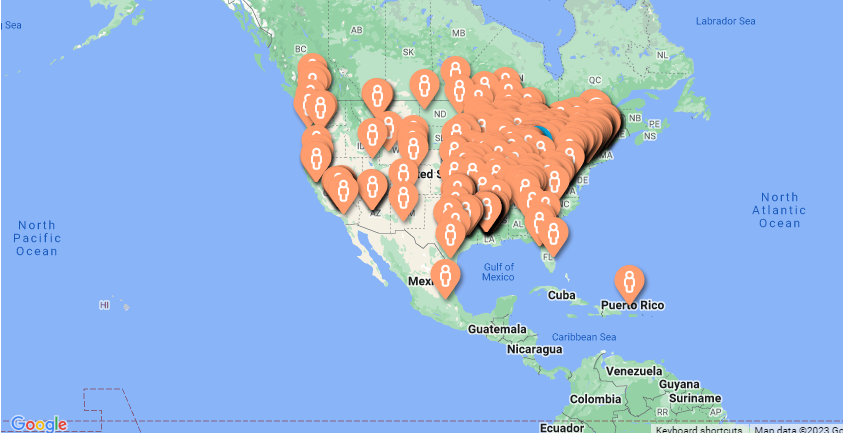
Here’s a short list of events for our partners. If you have an event that you’d like to add to our list, please email events@iacmi.org.
October 3
Polk State College Manufacturing & Supply Chain Virtual Lunch & Learn, 10:40AM – 12:10P
RSVP to Christopher Yannes at Polk State: cyannes@polk.edu
October 5
MSU Scale-up Research Facility (SuRF) is hosting approximately 150 students from four Detroit area public schools in the morning, along with SPE PlastiVan for tours and hands-on learning activities. They will also be hosting approximately 50 students from a charter school in the afternoon along with SPE PlastiVan and BASF.
October 6
- TN MADE (sponsored by MSC), Come prepared to visit partner booths for demos, listen in on exclusive podcast sessions and networking with peers. Register Now
- NJMEP (largest on East coast), Join the New Jersey manufacturing community at the 11th Annual ‘MADE in New Jersey’ Manufacturing Day! Do not miss your chance to network, learn, and connect with the information and resources available to the New Jersey businesses. Register Now
- West Virginia Makes Festival, The West Virginia Makes Festival, the state and region’s largest maker fair, returns Friday, October 6, 2023! The 10th annual festival on the Huntington campus of Marshall University promises to be bigger and better than ever! Join the celebration of creativity and ingenuity in all forms. Show off your innovations, inventions or other creative endeavors and compete for prizes, including cash! See awe-inspiring demonstrations. Participate in hands-on making activities for people of all ages. More Information
October 11
Long Island Manufacturer’s Career Booths. Manufacturers want to meet YOU. The whole front lobby of the Cradle of Aviation is turned into booths with displays of the companies and organizations, and manned by those anxious to tell you of the amazing opportunities. Register Now
October 12
Indiana Composites Industry Day will be October 12 at Purdue University’s Indiana Manufacturing Institute. The one-day workshop will showcase the future of composites manufacturing and simulation, feature a facility tour and highlight how Purdue and the Indiana Economic Development Corporation are attracting industry to the state and helping businesses to expand. Space is limited to the first 75 registrants. Register Today
October 19
Suffolk Community College, NY Long Island Manufacturer’s Career Booths. There will be companies and organizations set up with displays, waiting to meet you to inform you of the great opportunities that they have to offer. Register Now
Expanding Machine Tool Training Centers Doubles Number of Trainees in 6 months
August 31, 2023 — In celebration of upcoming Labor Day which honors hard working Americans, the Institute for Advanced Composites Manufacturing InnovationÒ (IACMI), in partnership with the Department of Defense (DoD), announced today that in the first half of 2023 it has doubled the number of people trained through its highly successful workforce development program, America’s Cutting Edge (ACE).
A national initiative to restore the prominence of U.S. machine tool technology and innovation, ACENet is a rapidly growing network that has doubled in-person trainees in computer numerical control (CNC) machining in the first six months of 2023. From March 2021 through December 2022, 300 participants completed the hands-on, in-person training. By June 2023, that number had more than doubled to 638, thanks to the expanding network of regional machine tool innovation and workforce development centers that IACMI is scaling up across America with DoD support.
ACENet is a public-private partnership funded by the DoD’s Manufacturing Capability Expansion and Investment Prioritization (MCEIP) office, which manages and executes the Industrial Base Analysis and Sustainment (IBAS) program. ACENet has expanded its in-person curriculum to more than 20 machine tool training centers in 9 states. These include Tennessee, North Carolina, Texas, West Virginia, Florida, Ohio, Kentucky, New Jersey, and most recently added, Minnesota. Together, they have hosted 30 training sessions called “bootcamps” in 2023 alone.
“You never forget the first time you machine something yourself,” said Adele Ratcliff, director of MCEIP’s Innovation Capability and Modernization (ICAM) office. “For many, ACE bootcamps are their first chance to run these machines. I’m confident that by expanding opportunities to engage in that process, more people in this next generation will be inspired to come into manufacturing and machining. Additionally, I’ve seen data showing that even highly experienced machinists and shop owners recognize the information presented in this course helps improve their overall effectiveness and efficiency.”
Much of the ACENet content was developed in 2020 by Dr. Tony Schmitz, who serves as a professor for the University of Tennessee, Knoxville (UT) and joint faculty for Oak Ridge National Laboratory (ORNL). ACE brings together the scientific expertise of ORNL, advanced training tools and techniques of UT, and the workforce development leadership of IACMI – The Composites Institute.
“The emerging ACE workforce training network is critical to helping build resiliency in America’s manufacturing capability and its global competitiveness,” said Joannie Harmon, vice president of workforce at IACMI. “It is inspiring to see how this program has grown, but even more inspiring when you realize these growing numbers represent people, people that are scaling up their abilities and contributing to workforce manufacturing needs in our nation.”
ACE training can be embedded in classes at high school, two-year, trades school, and four-year programs and offered as camps that take about 32 hours to complete. Participants learn about computer aided design (CAD), explore subtractive and additive manufacturing techniques, and machine four parts of a functioning air engine, which they get to keep. The goal is to experience the full spectrum of manufacturing—from digital design to computer code to cutting. This rapid growth in trainees proves there is a thirst for this type of training, which is offered at no cost.
All participants in the hands-on training course first complete a 6-hour online introduction to CNC machining. Launched in December 2020, ACE online has seen consistent growth for the past 138 weeks. ACE continues to expand by offering more courses including Metrology, Cybersecurity, and Composites. More than 5,500 people from all 50 states have engaged in ACE online training. Demographics for online registrants have remained fairly consistent over 2 years. Approximately 72% are students from academia and 27% are from industry. ACE is attractive as an introductory course to machining, as 75% of participants have no prior CNC experience. Machining and machine tools are at the foundation of America’s manufacturing capability and its global competitiveness, and the need for motivated skilled technicians has never been greater.
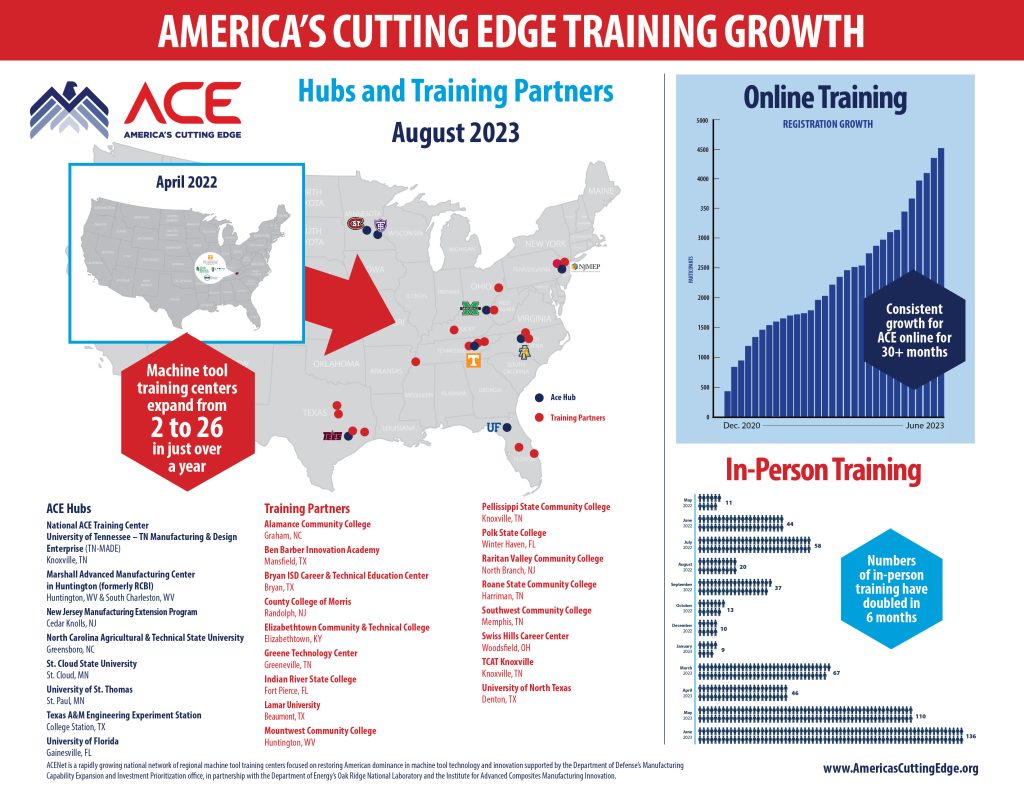
Written by: Stephan Biller, Amrine Distinguished Professor in Industrial Engineering and the Purdue Business School at Purdue University

Our current political divisiveness is grounded in the separation of haves and have-nots. It stinks to be on the have-not side, and it can happen to anybody. Manufacturing helps to move people to the have side. So, how can we bring offshored manufacturing back to the United States, and how can we ensure that current manufacturing stays in our country?
The answer is smart manufacturing, fueled by widespread digital transformation across the entirety of the production sector. My colleague Byron Pipes recently talked about how democratization of this digital transformation — where all participants in the supply chain have access to advanced digital technology — will be critical for manufacturing to survive and thrive, especially for small to midsize manufacturers (SMMs). This will be even more important in industries and states that produce parts for the internal combustion engine, such as Indiana. In essence, these companies need to transform both product and process simultaneously.
Smart manufacturing uses and integrates digital software tools and data throughout the product lifecycle. In a smart plant, every resource is digitalized. That means not only every operation, every cell (grouping of machines), and every line that is contributing to production, but also every forklift, all maintenance operations, inventory count on the line, and even the inventory that is still on the road and will arrive at the plant in a few hours is digitally tracked and optimized.
In a smart manufacturing plant, we always have perfect visibility into the current state of the plant (are we ahead of plan or behind, what machines are up or down, etc.). We have AI tools that will allow us to predict when things will deviate from the optimal stage. We have decision support systems that will guide us to make the best possible decision for the six key performance indicators (KPIs) — throughput, quality, cost, on-time delivery, sustainability, and (the latest addition) resiliency. These KPIs are interdependent, so it is crucial that all data and tools are integrated, enabling us to see the impact of any decision on all six KPIs simultaneously.
Smart manufacturing consists of five connected major elements:
- Virtual manufacturing. We take a digital representation of a product (a “product digital twin”) as input and simulate its launch in a virtual factory to optimize manufacturing processes and systems (“process digital twin”), so we can find and solve problems beforehand in both product performance and process.
- Optimization of factories and supply chains in real time on the factory floor. We feed plant-floor data into process digital twins roughly every second, from controls, robots, sensors, cameras, and IT systems — or even from technicians, supervisors, or plant managers — and then use AI and analytics to optimize the factory’s KPIs.
- Predictive maintenance. When customers are using the product, sensors on the product predict when it will have to be maintained and what maintenance will have to be performed. Sensor data and decision support software helps direct the product into the most appropriate service shop. You might have seen this when your car continuously tells you its remaining oil life, which is based on sensoric and driving data.
- Real-time optimized service shops. In the service shops, we optimize for throughput, quality, cost, and on-time delivery, again modifying the digital twin of the real product.
- Digital thread. Smart manufacturing requires seamless data connectivity — a “digital thread” from virtual manufacturing through factory and supply chain, to usage, to service shop, back to product design “closing the loop.” We analyze data and optimize all along this digital thread to continuously improve product and manufacturing.
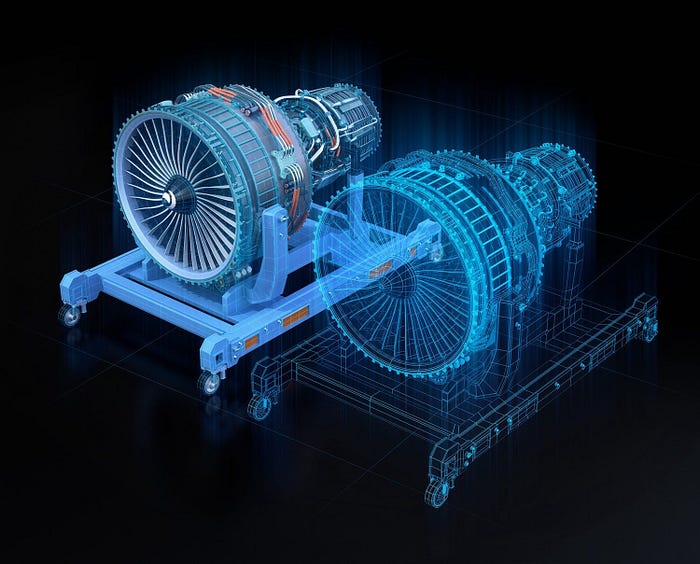
We are still in the early stages of the smart manufacturing revolution, and hurdles remain. Some 98 percent of all manufacturers are SMMs, with fewer than 500 employees. A lot of them don’t have the people and resources to implement smart manufacturing. And even if they solve the resource problem, they often still don’t know where to start. We talk a lot about resilient supply chains these days, especially after the COVID-19 pandemic. But resilient supply chains require digitalization and transparency for the entire supply chain — not just for the large manufacturers.
We are planning three major initiatives at Purdue to advance smart manufacturing:
- We will build a demonstration of a complete smart manufacturing loop, including tools for real-time factory and supply optimization.
- We will help create the manufacturing research and innovation ecosystem for SMMs, engage with students and the National Institute of Standards and Technology (NIST) Manufacturing Extension Partnership in pilot implementations, and explore new not-for-profit business models to scale innovations for SMMs (and large manufacturers).
- And we will create groundbreaking educational offerings in the Purdue School of Business to make it the best business school for digital-industrial technology on the planet.
On a personal note, I worked at General Motors when we went through bankruptcy and it was not clear if the U.S. auto industry would survive. The industry’s demise would have meant that most of Michigan (and maybe Ohio and Indiana) would have been deindustrialized. I had a newborn and a 4-year-old at the time, and I was worried for their future. I still vividly remember the depressed mood of the community, where nobody smiled anymore. I understand and empathize with communities where manufacturing has disappeared, and understand the societal impact on those communities.
Smart manufacturing can help keep existing manufacturing in the U.S. and contribute to reshoring efforts. The key innovation is the seamless integration of digital tools to create the smart manufacturing loop in order to continuously improve product and manufacturing throughout the entire value chain, making it more profitable, more sustainable, and more resilient — hitting the refresh button on the American dream.
A popular bootcamp is returning to Oak Ridge High School this spring thanks to a recent partnership between Roane State Community College and the Institute for Advanced Composites Manufacturing Innovation® (IACMI).
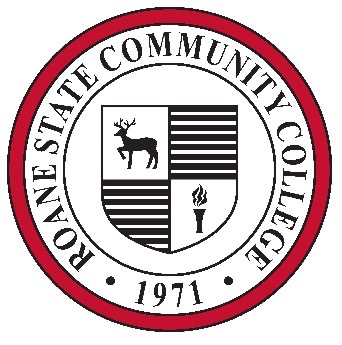
Roane State announced its workforce training partnership with IACMI last year, making the college just the third location in the State of Tennessee to offer specialized no-cost machine tool training opportunities through America’s Cutting Edge (ACE).
ACE is a joint Department of Defense (DoD) and Department of Energy (DOE) effort launched in 2020 to reestablish American leadership in the machine tool industry through transformative thinking, technology innovation and workforce development.
Roane State and Oak Ridge High School educators joined specialized instructors over fall break for a CNC Bootcamp at the high school. The session welcomed the youngest ever ACE training participant, Oak Ridge student Harry Shanafield, who was 13 when the camp took place.
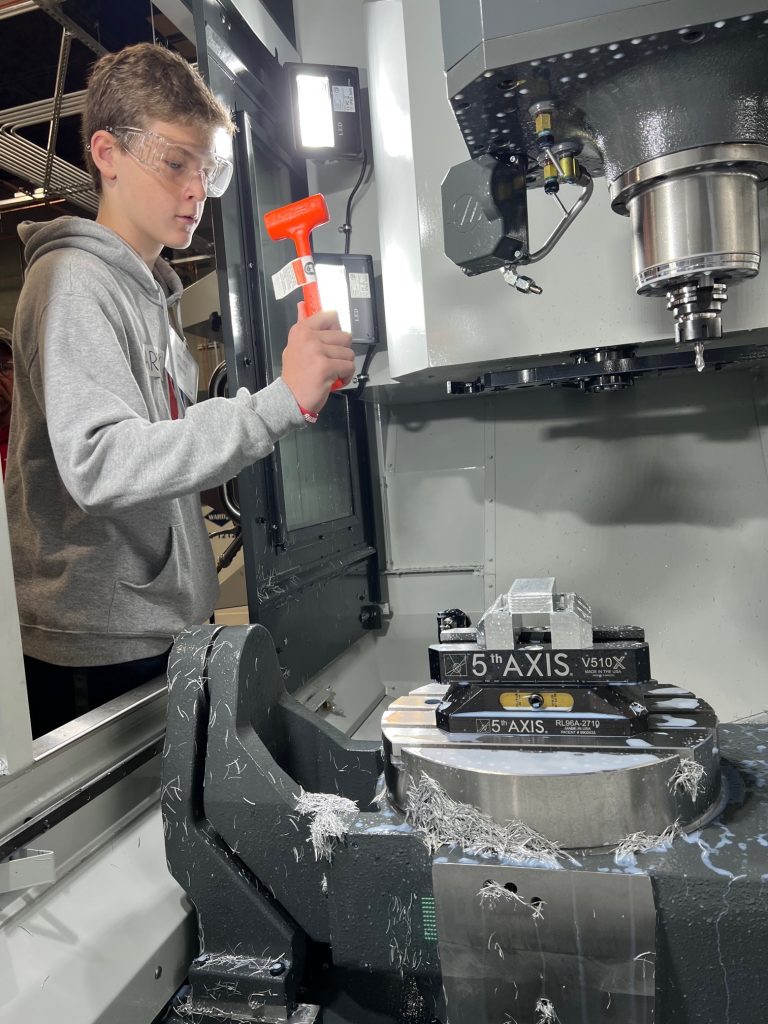
“That’s pretty cool, but I don’t think it matters because I can learn just like everyone else,” he told camp organizers when learning about the milestone. Shanafield used Fusion 360 design software during the camp and machined his first part with a 5-axis machine.
Many of the camp’s participants plan on pursuing careers in fields such as electrical engineering, machining, robotics, and aerospace.
“You’re always going to have a job. All the jobs are in CNC now because they’re so efficient,” said camp participant Eric Ellis, 19. “Everything you will see out there, a machinist has touched or designed, and I think that’s really cool.”
“Free programs like the CNC Bootcamp with IACMI and ACE are a critical component of our plan to meet the needs of the manufacturing workforce in our region,” said Teresa Duncan, Roane State’s vice president for workforce and community development. “As those needs grow, we will continue to invest in quality training and education opportunities for our students of all ages and skill levels.”
The CNC Bootcamp will return this spring at Oak Ridge High School with exact dates to be announced soon. Additional locations will be added as the program expands. Registration information will be shared online. Visit roanestate.edu/ACE for the latest information.
If you have a group that would like to participate as a cohort, please contact camp coordinator Evan Lohrey at lohreye@roanestate.edu. More information about the programs is available online at AmericasCuttingEdge.org.
About Roane State Community College
Roane State is a two-year college providing transfer programs, career-preparation programs and continuing education. Founded in 1971, the college has locations in Roane, Campbell, Cumberland, Fentress, Knox, Loudon, Morgan, and Scott counties as well as a branch campus in Oak Ridge. For more information, visit roanestate.edu or call (865) 882-4554. Remember, eligible adults can now attend Roane State tuition-free with the new Reconnect grant. Learn more at roanestate.edu/reconnect.
About IACMI – The Composites Institute
IACMI – The Composites Institute is a 130-plus member community of industry, universities, national laboratories, and federal, state, and local government agencies working together to accelerate advanced composites design, manufacturing, technical innovation, and workforce solutions to enable a cleaner and more sustainable, more secure, and more competitive U.S. economy. IACMI is managed by the Collaborative Composite Solutions Corporation (CCS), a not-for-profit organization established by The University of Tennessee Research Foundation. A Manufacturing USA institute, IACMI is supported by the U.S. Department of Energy’s Advanced Manufacturing Office, as well as key state and industry partners.